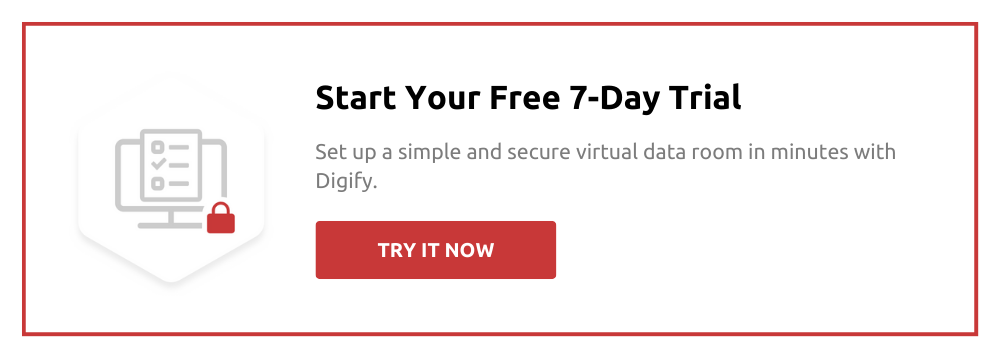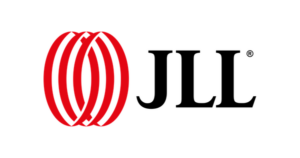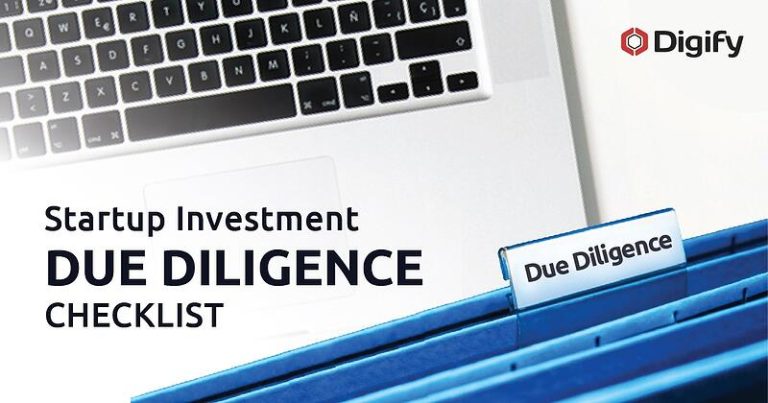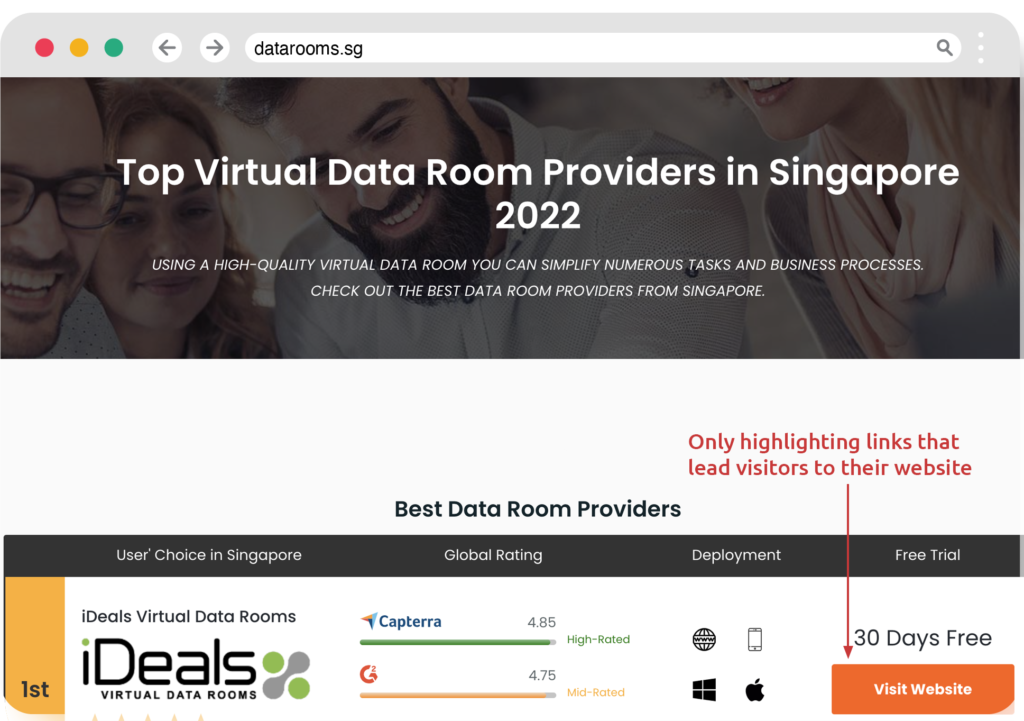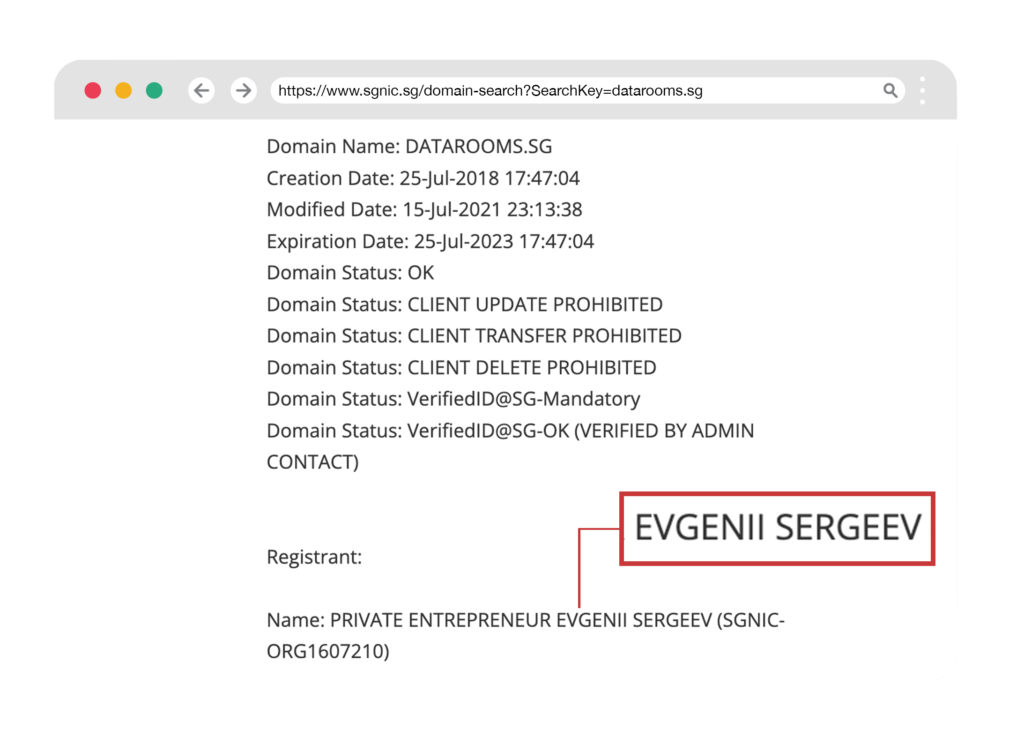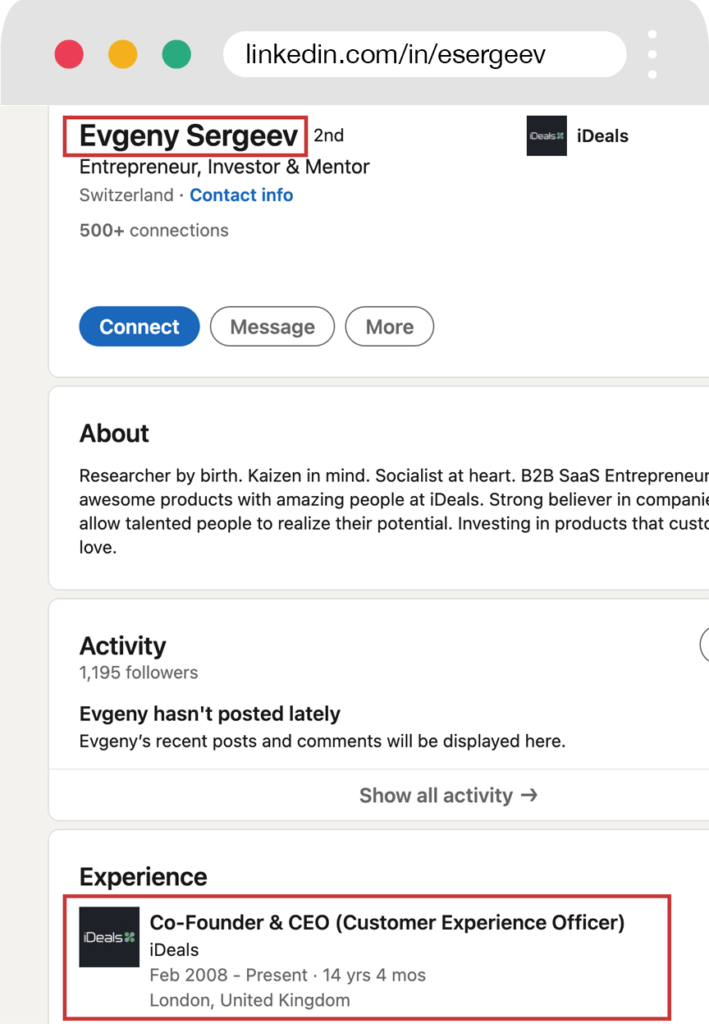Exchange of documents is a fundamental part of different businesses across industries – from mergers and acquisitions to legal proceedings and regulatory compliance.
Over the years, the demand for more efficient, secure and flexible methods of sharing documents grew. Companies began to use solutions like cloud storage apps and virtual data rooms to facilitate this document sharing, leading to their widespread use nowadays.
Today, these modern solutions help cross the barriers of physical document sharing and make the documents available to the relevant stakeholders instantly.
However, with all the different document sharing solutions available and the buzz around virtual data rooms, you may be wondering which solution is best for your needs.
In this article, you will learn what virtual data rooms are, how they differ from cloud storage apps and when you should use a virtual data room.
History: From Physical to Virtual Data Rooms
Let’s take a journey back in time to understand how Virtual Data Rooms (VDRs) changed the way businesses handle document sharing today.
Before virtual data rooms, people used to share documents through labor-intensive physical data rooms. These were secure and confidential physical spaces used for the storage and examination of sensitive documents commonly for financial transactions, legal proceedings and mergers and acquisitions.
These rooms, often located at a secure off-site location, were carefully controlled and access was strictly regulated to ensure that only people inside these premises could view the important documents there. This was time-consuming and cumbersome, as individuals involved in due diligence or legal proceedings often had to travel to the physical location of the data room to manually look through stacks of documents slowing down the transaction process.
Moreover, the physical constraints limited the number of people who could review documents at any given time, further delaying the review process.
VDRs started replacing physical data rooms and other solutions around the year 2000. The introduction of VDRs marked a turning point. No longer did people need to visit a secure location to access confidential physical documents. The hassle of managing physical documents – the printing, the filing, the storing – all gone.
With VDRs, documents could now be digitally stored, secured, and accessed from anywhere, at any time. This meant that multiple parties could review necessary documents together, without the need to be in the same room or even the same country.
A virtual data room significantly cuts down the time and costs associated with physical document handling, making the entire process a matter of just a few clicks.
What is a virtual data room?
A virtual data room (aka VDR, deal room or digital data room) is an online secure document repository that facilitates storage and distribution of important documents.
These virtual storage spaces are securely designed to support information sharing over the internet with authorized users during mergers and acquisitions, due diligence, legal transactions, etc.
Virtual data rooms vs. Cloud storage apps
Cloud storage is a method of storing and sharing documents ‘on cloud’, which is a network of remote servers that can be accessed over an Internet connection. This means instead of keeping files on your computer’s hard drive or local storage devices, you can save them to a web service maintained by a third party.
Both data rooms and cloud storage apps share some similarities like
- Online storage and access: Both data rooms and cloud storage apps allow for the storage of data on remote servers, enabling you to access their information from anywhere with an internet connection.
- Security measures: They employ security protocols to protect stored data. This includes secure user authentication and permission settings to control who can view or edit specific documents or data.
Now, data rooms and cloud storage apps might seem similar at first glance, given both serve the purpose of storing and sharing digital documents.
However, the differences between them become clear once you consider the specific needs of your business like complexity and sensitivity of documents.
Let us delve deeper into some key advantages of virtual data rooms over cloud storage apps.
- More branding options: Data rooms often offer you the ability to change the logo and branding colors of the site. More advanced branding options such as deeper branding customizations to the about page and a dedicated white-labeled URL may be available with some providers.
- Advanced guest management and granular permissions: Cloud storage apps are designed to scale in terms of data volume. These offer broad access controls on a folder/document like who can view, comment on, or edit documents. However, users of cloud storage apps would find it challenging to configure the document permissions necessary in a due diligence deal involving multiple counterparties. In contrast, VDRs are designed to scale both in the volume of data and in the management of data room guests and their activities. With granular permissions and groups, data room admins can create groups and detailed permissions for documents, while maintaining a clear overview of these at scale.
- Due diligence specific workflows: Cloud storage apps can cater to general use cases but are not adequate to support specific workflows like for due diligence. VDRs are built to streamline and support due diligence with features that can help save time and money for all parties involved in due diligence. Some examples of relevant features include:
- Terms of Access: Data room guests will need to agree to legal terms before they can view the data room.
- Q&A: Data room guests can post questions and receive answers to documents
- Automatic File Index: In due diligence, it is often required to number files that correspond to a due diligence checklist and you can automate that.
- Email reminders: Informing data room guests of new files uploaded, or automatic reminder for guests to view the files
- Advanced Document Security: Cloud storage apps include basic security features and protect against unauthorized access only during transmission and storage. VDRs address the needs of sensitive business transactions and come with advanced security measures. Some examples are:
- DRM (Digital Rights Management): Control if recipients can copy, print, download the document. It also allows you to revoke the document access.
- Dynamic watermarking: The recipient’s email address can be added to the watermark in real-time. Depending on the provider, additional options (IP address, date, time) may be available.
- Discourage screenshots with special features, offered by selected providers.
- Advanced expiry options: You have options such as when viewing may start, or revoking access automatically after a certain period.
- Advanced Analytics: Analytics in cloud storage apps typically focus on usage statistics, such as storage space consumed and current access. VDRs offer much more detailed and transaction-focused analytics including user activity tracking at a granular level, such as which documents are most viewed, the duration of viewing, page-by-page engagement, and the tracking of user questions and document requests. Such detailed analytics are important for gauging interest of the counterparties and schedule follow ups.
Why should you care about using virtual data rooms?
Whether you’re managing a business, handling sensitive legal documents, or overseeing financial transactions, the importance of data rooms cannot be overstated.
Let us quickly learn how virtual data rooms can benefit your business as a whole compared to cloud storage apps and other document sharing solutions.
01. Maintain a professional image to your guests
If you are raising millions or selling your company, you would want to share your files using a data room instead of using a cloud storage app so that you can appear more professional to your LPs, investors, acquirers, or partners.
This often goes beyond branding customizations that makes your data room more tailored to your brand. Further, the guest experience of accessing a large volume of documents is typically much better with a data room. By using a data room, you are also signaling that you understand that the complex demands of document sharing in due diligence require higher security and tailored workflows that are simply not available in a standard cloud storage app.
02. Faster transactions
Efficiency lies at the heart of virtual data rooms. By allowing for efficient document sharing, review, and collaboration in a secure environment, VDRs can significantly reduce the time required to complete transactions.
Faster access to information and streamlined communication with features like Q&A help you reach agreements quicker, accelerating the overall transaction timeline.
03. Eliminate repetitive tasks
VDRs can automate a lot of routine processes that are traditionally manual and time-consuming. These include indexing files, setting up permissions, document version control, sending reminders and more. This saves the precious time of your team and reduces the potential for human error in complex transactions or document-heavy processes.
04. Better decision making
With built-in analytics, reports and versioning, VDRs offer insights into how documents are being accessed and interacted with. This can inform better decision-making, allowing you to identify which documents are drawing the most attention from investors or partners and potentially where to focus discussions or negotiations.
Analytics can also highlight potential bottlenecks or issues in document access, enabling proactive management of the data room.
05. Global accessibility
VDRs are designed to eliminate the hassles and the extra costs of traveling to physical data rooms to access important documents.
Virtual data rooms ensure there are no geographic barriers, as stakeholders from around the world can engage with documents in your data room at any time, from any location, provided they have internet access. This global accessibility also encourages participation from international investors and partners, expanding the potential of your business.

Evaluating your need for a virtual data room
It is important that you first identify your specific needs and then align them with the unique features and benefits of virtual data rooms. Following are the ways in which you can use VDRs and simplify your document sharing processes.
01. M&A consultation and dealmaking
In M&A deals, usually a large amount of confidential documents are exchanged between the buying and selling parties to evaluate the compatibility. This includes financial records, legal documents, employee information, and intellectual property details.
VDRs provide a secure, organized platform for you to facilitate this exchange, allowing both parties to conduct due diligence efficiently. Features like watermarks, screenshot prevention and customization options allow you maintain a professional image while ensuring there are no information leaks throughout the negotiation.
02. Fundraising & due diligence
Most often investors or limited partners request for a virtual data room as they go through an exhaustive due diligence exercise with a company/fund they are putting money into.
You must begin using VDRs to organize all the documents needed for fundraising such as pitch decks, financials and share with multiple investors all at once. It allows you to set what each investor sees with document level access, leave a professional impression, and easily gauge investor interest with in-built analytics.
03. Financial and legal audits
If you have been a part of any audit process previously, you’d know how tedious the process can get. Audits require companies to provide auditors or accountants access to their important financial records, contracts, and compliance documents to verify their accuracy and adherence to regulations.
Centralizing compliance documents in a secure, accessible environment is done using virtual data rooms. Along with security, these also offer detailed tracking after the files are shared ensuring you get access to the audit trail for transparency.
04. IPO preparation
You’ve worked really hard to get to this point and launch your IPO. But, do you have everything you need to make it happen?
If you’re preparing for an IPO, know that you will be sharing a ton of different documents with regulators, lawyers, and banks. Facilitating the organization and sharing of sensitive documents with all parties involved should be done using virtual data rooms.
You can maintain a professional impression using data room branding options, comply with regulatory requirements and expedite the IPO application.
05. Business/strategic partnerships
Forming strategic partnerships requires you to explore synergies between both the parties.
To do just that, you’d want to exchange confidential information for evaluating the ROI of the partnership. A virtual data room must be used to create a safe environment for sharing this information so that it is only accessible to authorized people. The security features also keep the news of potential partnerships under the wraps.
06. IP protection
If you are a company with valuable intellectual property (IP) like patents, trademarks, research data etc, we know protecting these assets is your number one priority.
VDRs are used for storing and sharing your IP-related documents. These help protect against unauthorized access and prevent potential IP theft throughout different business transactions with features like watermark, selective distribution, document expiry, download restriction and more.
07. Investor relationship/board management
Regular, transparent communication with your investors and board members is necessary to sustain their trust in your company.
A virtual data room allows you to maintain these communications while making sure your confidential business documents are secure and accessible only to authorized stakeholders. It also gives you visibility into who viewed which document and for how long so that you can plan your next steps accordingly.
Need a virtual data room but not sure where to start?
If your needs match one of the use cases mentioned above, then it’s time to get started with a virtual data room today.
Begin by identifying the popular virtual data room providers like Digify, Intralinks, among others. Compare their features, security protocols, customer support, and pricing structures. Assess how your specific needs, including document volume, security requirements align with their offerings.
Take advantage of free trials or demos offered by virtual data room providers to experience their platforms firsthand. Finally, plan for a smooth implementation and ensure your team is well-trained to make the most of your virtual data room.
What sets Digify apart as a virtual data room solution?
Digify offers a unique combination of features and benefits to carry out seamless document sharing and analysis.
Here’s a closer look at what makes Digify special.
- Simplicity: Users and their guests love Digify’s ease of use. Digify has a unique approach to document security that’s simple and hassle-free. Even if your guests are not tech savvy, they will find secure documents on Digify easy to access. This is important for you to close your deal or complete projects quickly.
- Advanced branding: Digify allows you to communicate your brand and message clearly to your audience, above and beyond what most competitors offer. Fully customize the visual aspects of your data room to align with your brand identity. This includes adding a configurable About page to explain your project, and changing the logos and brand colors. We offer advanced branding to customize the login screen, backgrounds, email layouts and even a white-labeled URL.
- Integrations and API: Digify probably offers the widest range of integrations of any virtual data room provider. Your users can login using their Google and Microsoft identities and integrate with over 6000+ other apps via Zapier. We also offer email plugins for Gmail and Office 365 to track email attachments. For more sophisticated needs, users can integrate complex workflows, or even build their own apps via our APIs.
- Unique security and analytics features: We offer advanced security features and analytics features that are not easily found in other data room solutions. Digify has a patent for its unique screen shield technology to discourage screenshots. Our dynamic watermarking features are one of the most comprehensive in the market. Digify has tripwire alerts to let you know if your files are leaked. Our detailed analytics features go above and beyond what’s offered by many competitors.
- Transparent pricing: Unlike many competitors, we publish our pricing clearly for most of our plans. We ensure you only pay for what you truly need, providing maximum value. In addition, there are no hidden fees, making it easy to know exactly what you’re paying for.
There’s much more to Digify’s virtual data room. Start a free trial and discover how our comprehensive features go beyond meeting your business needs.
